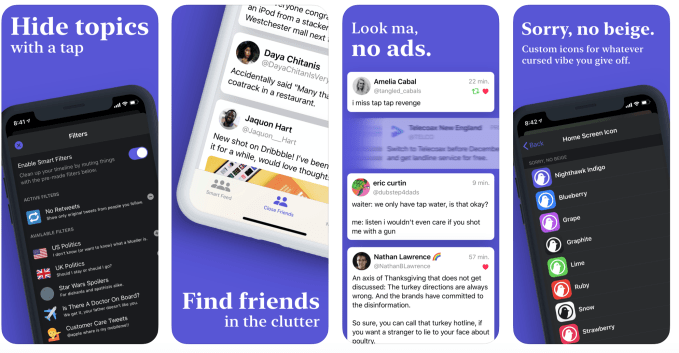Welcome back to This Week in Apps, the Extra Crunch series that recaps the latest OS news, the applications they support and the money that flows through it all.
The app industry is as hot as ever, with 194 billion downloads last year and more than $100 billion in consumer spending. People spend 90% of their mobile time in apps and more time using their mobile devices than watching TV. Apps aren’t just a way to waste idle hours — they’re big business, one that often seems to change overnight.
In this Extra Crunch series, we help you to keep up with the latest news from the world of apps, delivered on a weekly basis.
Headlines
The top apps of the year… and the decade
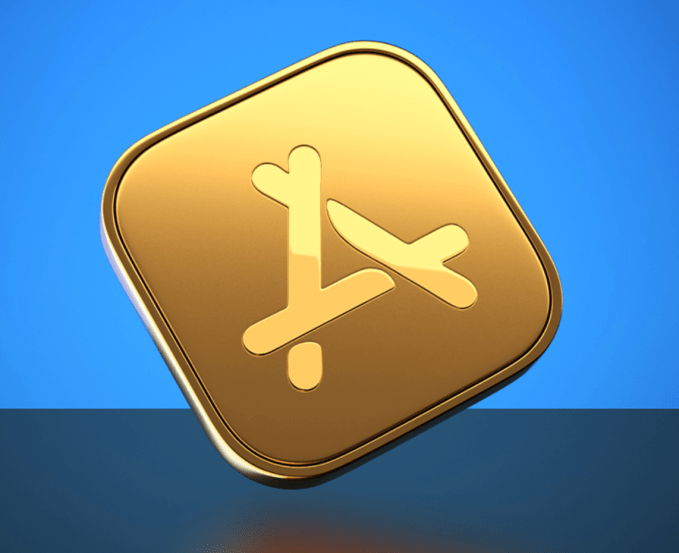 App Annie this week released its list of the year’s top apps. And this time around, it also included the top apps of the past 10 years in its analysis. Outside of games, Facebook dominated the decade, the firm reported. It ran the four most-downloaded apps of the decade, including Facebook (#1), Messenger (#2), WhatsApp (#3), and Instagram (#4). Other communication and social media apps were also among the most popular over the past 10 years, claiming seven out of the 10 top spots, including Snapchat (#5), Skype (#6) and Twitter (#10). Social video platforms TikTok and YouTube also placed on the list at #7 and #9, respectively. And yes, it’s pretty notable that TikTok — an app that only launched outside of China in 2017 — is one of the most-downloaded apps of the past decade. Meanwhile, even though dating app Tinder was the most profitable app this year, Netflix was the No. 1 app by all-time consumer spend over the past decade.
App Annie this week released its list of the year’s top apps. And this time around, it also included the top apps of the past 10 years in its analysis. Outside of games, Facebook dominated the decade, the firm reported. It ran the four most-downloaded apps of the decade, including Facebook (#1), Messenger (#2), WhatsApp (#3), and Instagram (#4). Other communication and social media apps were also among the most popular over the past 10 years, claiming seven out of the 10 top spots, including Snapchat (#5), Skype (#6) and Twitter (#10). Social video platforms TikTok and YouTube also placed on the list at #7 and #9, respectively. And yes, it’s pretty notable that TikTok — an app that only launched outside of China in 2017 — is one of the most-downloaded apps of the past decade. Meanwhile, even though dating app Tinder was the most profitable app this year, Netflix was the No. 1 app by all-time consumer spend over the past decade.
2019 app downloads and consumer spending
Related to its round-up of the top apps, App Annie also offered some preliminary data on downloads and consumer spending in 2019. Its current figures don’t include calculations from third-party app stores in China, (like those referenced above), which App Annie tends to provide in its annual State of Mobile report. Instead, App Annie reports we’re on track to see 120 billion apps from Apple’s App Store and Google Play by the end of 2019, a 5% increase from 2018. Consumer spending was also up 15% year-over-year to reach $90 billion, it says. Expect a full analysis to come in Q1 2020.
Facebook still sat at the top of the charts for 2019. The company’s Messenger app was the most downloaded non-game app of 2019, followed by Facebook’s main app, then WhatsApp. Tinder switched places with Netflix for the No. 1 spot on this chart — last year, it was the other way around. (For more details, TechCrunch’s full review is here.)
2019 in Mobile Gaming
According to a year-end report by GamesIndustry.biz, mobile gaming grew 9.7% year-over-year in 2019 to reach a market value of $68.2 billion. The gaming market as a whole was worth $148.8 billion, the report said. Smartphone games were the biggest piece of this figure, at $54.7 billion, compared with $13.4 billion for tablet games. That means smartphone games are still bigger than PC, browser PC games, boxed and downloaded PC games, and console games.
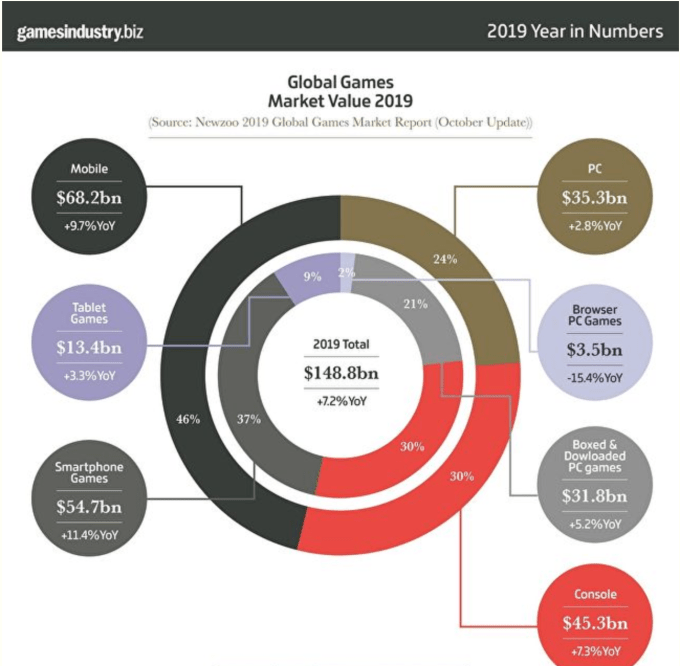
Big moves in cloud gaming
To beef up its new cloud gaming service Stadia, Google this week bought game development firm Typhoon Studios, who were set to release their cross-platform title and first game, Journey to the Savage Planet. Google had said it wants to build out a few different first-party studios to release content on Stadia, which is where this acquisition fits in. Meanwhile, Facebook this week acquired the cloud gaming startup, PlayGiga, which had been working with telcos to create streaming game technology for 5G.
Stadia has a big mobile component, as its controller can play games on compatible mobile devices like Pixel phones. Gaming has been a big part of Facebook’s mobile efforts, as not only a platform where games can be played, but also a place to watch live game streams, similar to Twitch. But the big gaming trend of the past year (which will continue into 2020) is cross-platform gaming — thanks to games like Fortnite, Roblox and PUBG Mobile, as well as devices like Nintendo Switch, gamers expect to continue playing no matter what screen they happen to be using at the time.
Apple Developer app expands support for China
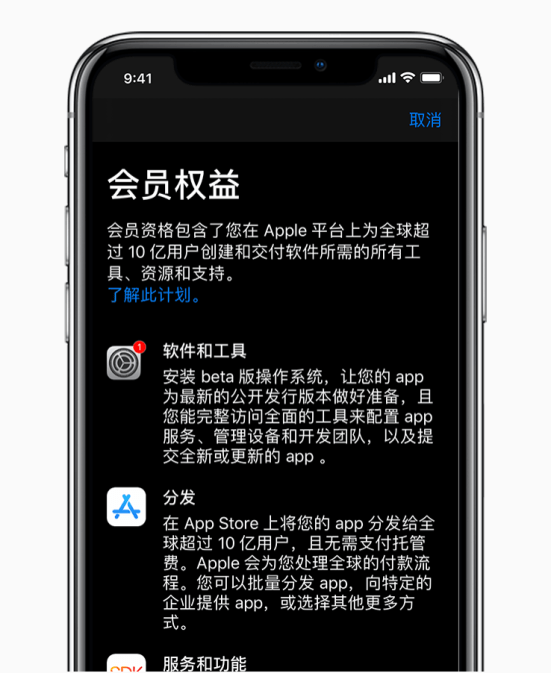 Apple launched a dedicated mobile app for its developer community in November, with the arrival of the Apple Developer app, which was an upgraded and rebranded version of Apple’s existing WWDC app. The app lets developers access resources like technical and design articles, as well as read news, watch developer videos, and enroll in the Apple Developer program. Now that the program is open to China through the app, Apple announced this week.
Apple launched a dedicated mobile app for its developer community in November, with the arrival of the Apple Developer app, which was an upgraded and rebranded version of Apple’s existing WWDC app. The app lets developers access resources like technical and design articles, as well as read news, watch developer videos, and enroll in the Apple Developer program. Now that the program is open to China through the app, Apple announced this week.
From the app, developers in China can start and complete their Apple Developer membership and pay with a local payment method on their iPhone or iPad. They can also renew their membership, to keep their account active. Apple has been heavily investing in growing its international developer community by launching developer academies and accelerators in key regions, among other initiatives. Over the past year, Apple grew its developer community in China by 17%, the company earlier said.
So much for nostalgia, Rewound gets yanked from the App Store
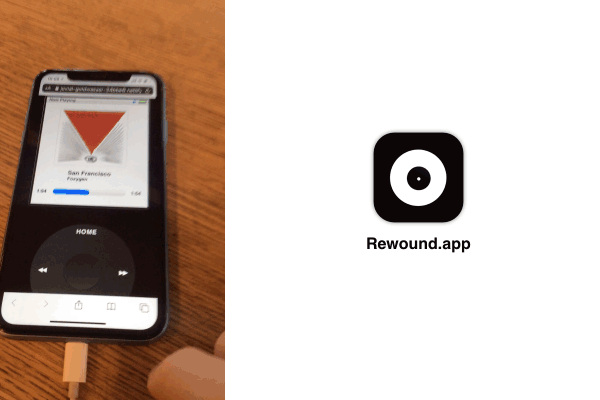 We hope you downloaded this fun app when we told you to in last week’s column! Because now it’s gone.
We hope you downloaded this fun app when we told you to in last week’s column! Because now it’s gone.
Rewound, briefly, was a clever music player app that turns your iPhone into a 2000’s era iPod, complete with click wheel nav. The developer was able to sneak the app into the App Store by not including the actual iPod UI, which infringes on Apple’s own product design. Instead, the UI pieces were hosted off-site — on Twitter accounts, for example. Users could find them and download them after they installed the app. Technically, that means the App Store app itself wasn’t infringing, but Apple still kicked it out. The developer also charged a fee to access the Apple Music features, which may have been another reason for its removal.
It’s no surprise Apple took this step, but the developer seems confused as to how the app could be approved then pulled later on, even though it hadn’t changed. That’s actually par for the course for Apple’s subjective, editorial decisions over its App Store, however. Now Rewound, which has 170K+ users after only a few days, will focus on a web app and Android version.
Facebook is building its own OS so it can ditch Android
Facebook wants to reduce its reliance on Android for hardware like Oculus or its augmented reality glasses, so it’s building its own OS. The company has hired a co-author of Microsoft’s Windows NT, Mark Lucovsky, to build an operating system from scratch, according to The Information’s Alex Heath. By having its own OS, Facebook could more deeply integrate social interactions into its devices and become less dependent on Google. Facebook says for now the focus is on building something to power AR glasses, but who knows what the future may hold. (Just please, not another Facebook phone.)
Teen game Photo Roulette raises security concerns
As usual, teens aren’t thinking things through, reports The WSJ. A popular mobile game for iOS and Android, Photo Roulette, lets players invite up to 49 people to a game where the app randomly shares one photo from someone’s Camera Roll with the group. Everyone tries to guess who the photo belongs to. Teens said they’ve seen nude photos, screenshots of flirty texts, embarrassing selfies, inappropriate memes, and other sensitive information come up — the latter including a teen’s SSN, which was stored in a photo of her Social Security card. The app developers didn’t respond to requests for comment until after The WSJ published its article. The game’s privacy policy says photos are deleted and not monetized, but c’mon — why even risk this? (Oh right, because you’re 16 and can’t process how actions and consequences work.) The security issues the game raises reminds users that not all our sensitive information is in our emails, texts, notes, and contacts — our Camera Rolls can also be very revealing, too.
Apple’s decade, reviewed
Walt Mossberg looked back on Apple’s past decade in a piece everyone was discussing this week. He says that, despite its financial success, Apple hasn’t produced any other hardware hits that match the scale or impact of the iPhone. The Apple Watch and AirPods are their category leaders, he notes, but even combined, only generated revenues comparable to that of the iPad. But is that fair, considering the devices’ lower price points and how they’re bigger than iPod ever was? After all, Google had to buy Fitbit to even matter in the wearables market, due to Apple Watch’s dominance here.
The column also seems to underestimate Apple’s bet on services (e.g. Apple Music, Apple Pay, Apple TV+, Apple News+, Apple Card, Apple Card), calling them “gambles.” As Apple is now turning iPhone itself into a subscription service you can pay for with your Apple Card, it seems instead the company is laying the groundwork for iPhone-as-a-Service — including whatever bells-and-whistles, like music or TV, you want to come with it.
More reasonably, the column does ding Apple for screwing up Mac for years and those awful keyboards.
Apple boots fitness apps from App Store after complaints of subscription abuse
The downside of the shift to subscriptions has been their adoption by shady developers. We recently reported that a big developer of fitness applications disappeared from the App Store following a number of consumer complaints about its use subscriptions. Consumers either didn’t know, didn’t understand or were tricked into subscriptions that cost as much as $150. BetterMe’s developer declined to comment on the matter but confirmed the apps are being reviewed by Apple. Collectively, the BetterMe line of fitness apps were downloaded 40 million times to date and users spent more than $85 million in the apps, according to Sensor Tower data. The apps may not be a household name, but it’s worth noting that Apple is cracking down on apps that abuse subscriptions — something it initially had turned a blind eye to.
App developer sues Apple over alleged manipulation of app rankings
Many developers are hesitant to speak out against Apple (at least until you’re the size of Spotify), but the company Blix, makers of an email management app called BlueMail, is suing Apple claiming evidence of chart manipulations. According to court filings, the developer says its app moved from 143rd to 13th place among mail apps after The NYT published its report about how Apple’s App Store Search results would show Apple’s apps first. The developer cited data from Sensor Tower as proof of its chart movement as well as spikes for other apps that were also competitive with Apple’s own apps. Additionally, Blix is suing Apple for patent infringement and antitrust violations. The company has been fighting to get its BlueMail app back into the Mac App Store, and claims Apple removed it unfairly and copied its patented technology.
Quick Bites
- Holiday Shutdown schedule: Don’t forget the App Store Connect is closing for the holidays. No new apps or app updates will be accepted from December 23 to 27, 2019 (Pacific Time).
- Apple releases a guide to Platform Security for Fall 2019. The 157-page document provides details about how security technology and features are implemented within Apple platforms, says Apple. It also helps organizations combine Apple platform security technology and features with their own policies and procedures to meet their specific security needs. The guide covers a range of topics including biometrics, system security, encryption, data protection, app security, services security, network security, developer kits, secure device management, and security certifications and programs.
- Apple Arcade gets an annual discount: Apple’s gaming subscription (and a good last-minute gift), Apple Arcade, is now available for $49.99 per year, instead of just $4.99 per month. This works out at $4.17 per month or the equivalent of getting two months a year free, notes 9to5Mac. The discount applies outside the U.S. as well, at CAD$59.99 in Canada, £49.99 in the UK and €49.99 in the EU.
- Photoshop for iPad improves: Still trying to recover from its rocky start, Adobe’s Photoshop for iPad this week added “Select Subject,” a feature Adobe introduced to the desktop version last year that offers a one-tap selection of the subject of your image, as determined by Adobe’s Sensei AI engine. Photoshop users weren’t happy with the watered-down release of Photoshop on iPad and Adobe has been trying to deliver a more polished, more professional-grade experience in the weeks since.
- Apple, Google, Amazon, Zigbee and others team up to develop an open smart home standard: The news is a tad outside the world of apps, but it will impact those building cross-platform experiences for smart home devices. Ikea, Legrand, NXP Semiconductors, Resideo, Samsung SmartThings, Schneider Electric, Signify (nee Philips Lighting), Silicon Labs, Somfy and Wulian are also on board. The plan for Connected Home over IP (CHIP?!) is to develop and promote the adoption of a new, royalty-free connectivity standard to increase compatibility among smart home products, with security as a fundamental design tenet. Yes, please.
- Funko mobile game acquired: N3TWORK, which makes games like Legendary: Game of Heroes, and Tetris Royale, acquired the rights to Funko Pop! Blitz from Universal Games, according to The Hollywood Reporter. The game is developed by Burbank-based Tic Toc Games (Panda Pop’s publisher) and features the Funko Pop! versions of characters from Universal’s Back to the Future, E.T. and Jurassic World.
- What a good year for Gardenscapes: The 5th highest-grossing puzzle game in 2019, Playrix’s Gardenscapes, grossed $1.5 billion from in-app purchases and seen more than 213 million installs globally since its August 2016 release, Sensor Tower reports.
- Animoca Brands bought game publisher nWay, the developer beyond Power Rangers: Legacy Wars (50m+ downloads), for $7.69 million, reported VentureBeat. nWay makes console, PC and mobile games. But the interest was likely more for its platform that enables cross-play for real-time multiplayer games, which is a huge and growing trend, as noted above.
- Roku’s app got a boost from Disney+. According to Apptopia, Roku’s Q4 2019 mobile app sessions are on pace to grows 54.4% year-over-year, and 18.6% quarter-over-quarter. The app, which acts as a remote for the platform, has gotten a bump thanks to Disney+’s launch, the firm says.
- Apple is rolling out its final phase of Apple Maps update for the U.S.
- Ten years of Apple in 10 minutes, the video.
Downloads
Whisk
This very good, A.I.-powered recipe organizer will encourage you to ditch Pinterest. Its biggest perk is that with just a click you can order all the ingredients you need from your favorite online grocery delivery service, including Walmart, Amazon, Instacart, and others.
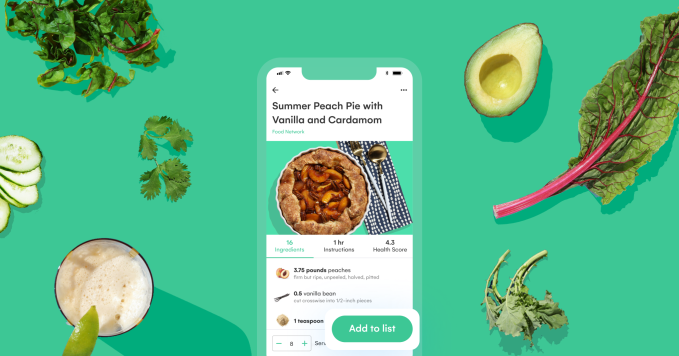
Nighthawk
Nighthawk, reviewed here by 9to5Mac, is a new Twitter client for iOS that differentiates itself from other apps in several ways. The biggest change is that it puts you in control of the timeline. The app provides tons of human-curated filters to clean up things you don’t want to see, whether that’s U.S. politics chatter, Star Wars spoilers, the latest meme that you’re sick of, tweets from customer care accounts and more. The app also offers an ad-free experience and a way to create a “Close Friends” timeline to help you make sure you see tweets from your most important friends.
